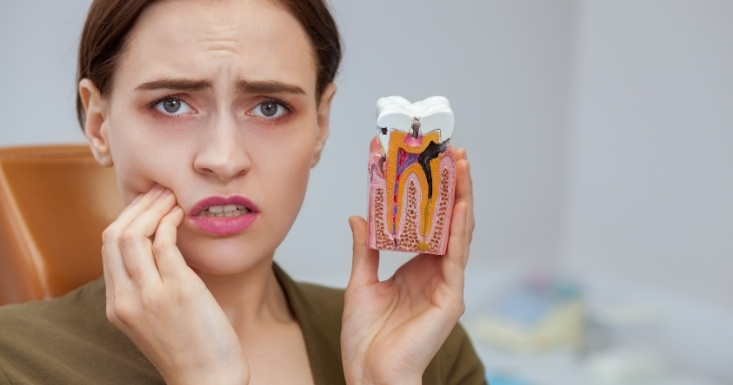
Whether for business or pleasure, traveling is often a time to explore new places, try different cuisines, and make unforgettable memories. Dental emergencies while on the go can be incredibly stressful, leaving you to wonder what to do if something goes wrong with your teeth far from home. Knowing how to handle dental emergencies while traveling can ensure you don’t let a toothache or injury ruin your trip. Here’s how you can stay prepared, calm, and confident in the event of an emergency dentistry situation on the go.
- Be Prepared Before You Travel: Pack a Dental Emergency Kit
The best way to handle a dental emergency while traveling is by being prepared. Creating a minor emergency dentistry kit is essential, mainly if traveling to remote areas or abroad where access to dental care might be limited. Here’s what should be in your kit:
- Pain relievers: Over-the-counter pain medications such as ibuprofen or acetaminophen can help manage toothaches or injuries until you can see a dentist.
- Antiseptic gel or mouthwash: Keeping your mouth clean can prevent infections, especially if you have a cut or injury in your mouth.
- Temporary filling material: If you lose a filling or crown, temporary filling material is available at most drugstores and can protect the tooth until you can see a dentist.
- Dental wax: If you have braces or other dental appliances, dental wax can cover sharp edges that might irritate your gums.
- Cotton swabs and gauze: If you experience bleeding from a tooth injury or gum issue, having gauze on hand is essential to stop the bleeding.
- Contact information for a local dentist: Before you leave, research and save the contact information of local dentists or clinics in the area you’re visiting. If an emergency arises, you’ll know exactly where to go.
Having these items readily available makes you feel much more in control if something goes wrong.
- Know How to Handle Common Dental Emergencies
Several common dental issues may occur while travelers are away from home. Knowing how to handle these emergencies can save you pain and time until you can seek professional care:
- Toothaches: A persistent toothache is often caused by an infection or decay. If you’re experiencing pain, rinse your mouth with warm water and use pain relievers as directed. Avoid hot or cold foods and drinks that might aggravate the pain. If the pain is severe, it may be a sign of an abscess or infection. It needs professional treatment as soon as possible.
- Broken or Chipped Tooth: If you break or chip a tooth while traveling, gently rinse your mouth with warm water to remove debris. Save any broken pieces of the tooth and keep them in a clean container. Apply a cold compress to reduce swelling, and contact an emergency dentist Austin, immediately for advice. If you can’t get to a dentist immediately, over-the-counter dental cement or wax can temporarily cover the sharp edges and prevent further damage.
- Knocked-Out Tooth: Losing a tooth can be a terrifying experience. However, if handled correctly, you may be able to save it. If your tooth is knocked out, try to hold it by the crown (the top part). Rinse it gently with clean water (don’t scrub it). Place the tooth back in its socket and hold it in place with clean gauze. If you can’t reinsert the tooth, moisten it in milk or saliva. The faster you get to a dentist, the better your chances of saving the tooth.
- Lost Filling or Crown: If a filling or crown falls out, don’t panic. Clean the area gently with water and try to temporarily place it back in place. You can use dental cement at most pharmacies to hold the crown or filling in place. If the filling or crown can’t be reattached, protect the tooth with temporary dental filling material until you seek care.
- When to Seek Professional Emergency Dentistry Help?
While many dental issues you can manage on your own temporarily, some situations require immediate professional attention. Here are a few signs that you should see a dentist as soon as possible:
- Severe pain that doesn’t subside with over-the-counter medication
- Extensive bleeding that doesn’t stop after applying pressure
- A knocked-out tooth that you can’t reinsert or preserve
- A severe infection or abscess (signs include swelling, fever, and pus)
- A significant fracture or break that affects the tooth’s nerve or root
- Finding Dental Care While Traveling
If you need professional oral care while traveling, don’t hesitate to seek help. Depending on your location, finding a dentist may require research. Start by checking your travel insurance policy, as many cover dental emergencies abroad. Alternatively, ask your hotel concierge for recommendations on local dentists. You can also search online for “emergency dentist near me” or use travel-specific apps that provide local healthcare listings. If you’re traveling internationally, consulting with a dentist before you leave is a good idea.
- Stay Calm and Don’t Panic
Dental emergencies are undoubtedly stressful, especially when you’re far from home. However, it’s essential to stay calm and assess the situation logically. Proper preparation, quick thinking, and a little patience help manage most dental emergencies until you receive the appropriate treatment.
Remember that the key to handling dental emergencies while traveling is to stay prepared, act quickly, and seek professional help when necessary. By following these emergency dentistry tips, you’ll be able to travel confidently, knowing that you have a plan to handle any unexpected dental issues. Safe travels, and remember to pack your dental emergency kit.

